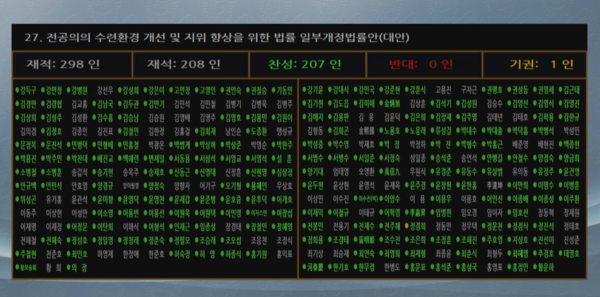A bill has passed the National Assembly's plenary session, restricting medical residents from working more than 80 hours weekly.
The new law will also prohibit doctor trainees from working more than 36 hours in a row and provide the basis for prioritizing the fostering of specialists in essential medical fields.
On Thursday, the National Assembly held a plenary session and voted on the “Amendment to the Act on Improving the Practice Environment and Status of Specialty Doctors”' containing these contents. The amendment bill passed the session by 207 of the 208 lawmakers present. No lawmakers voted against the amendment, with one abstention.

The amendment is an alternative to a bill introduced by Reps. Shin Hyun-young and Choi Hye-young of the Democratic Party of Korea, limiting the weekly working hours of medical residents to no more than 80 hours. The amendment sets the weekly working hours for doctor trainees within the 80-hour range, as determined by the Ministry of Health and Welfare ordinance.
It also will not allow continuous working hours to exceed 36 hours by stipulating it "within the range of 36 hours to be determined by the Ministry of Health and Welfare ordinance.” The provision allowing interns and residents to work up to 40 hours in case of an emergency was also revised to "within the range of 40 hours to be determined by the Ministry of Health and Welfare decree.”
Besides, the bill called for the government to provide administrative and financial support for fostering medical residents while prioritizing specialists designated by presidential decree as requiring improvement of the training environment.
The amendment will take effect two years after its promulgation. The provision for prioritizing the development of essential majors will take effect six months after its promulgation.
"The shortage of doctors in essential medical departments has resulted in the exploitation of specialists’ labor, causing concerns about patient safety." Rep. Choi said. "With the amendment's passage, I will continue my legislative activities to help improve the fundamental training environment."
The “Amendment Bill for Special Measures for Healthcare in Rural Areas,” which calls for surveying the optimal supply of public health doctors, also passed the plenary session. All 192 lawmakers present voted in favor of the amendment.
The amendment requires the government to survey the supply status of public health centers every three years and the placement of public health centers in medically vulnerable areas to understand the actual situation of public health centers and to publicize the results.

